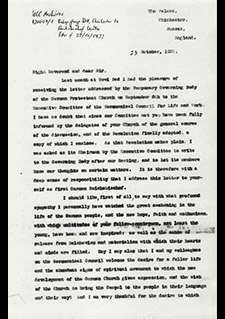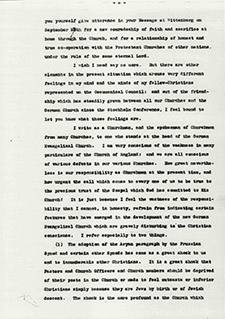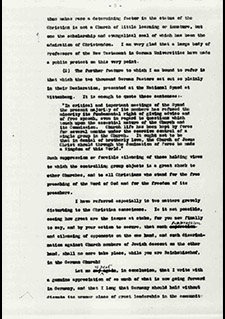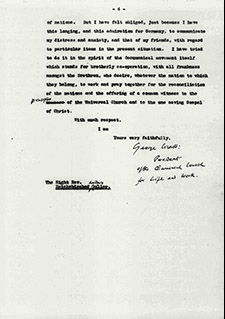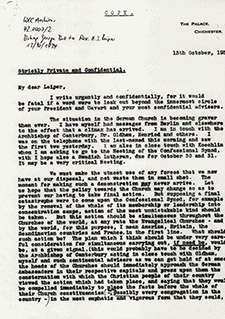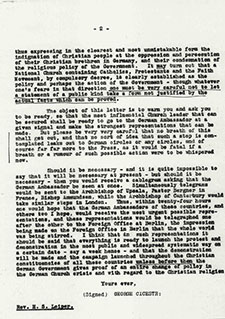Support for the Confessing Church
In his function as president of the Ecumenical Council for Life and Work, George Bell had met with church leaders in Berlin in February of 1933 and begun to support the Confessing Church. He championed their cause not only with church officials but also political figures such as the German ambassador in London, the German Foreign Minister Joachim von Ribbentrop and the deputy to the Führer Rudolf Hess.
On October 23, 1933, Bell wrote to Reich Bishop Ludwig Müller: It is just because I feel the vastness of the responsibility that I cannot, in honesty, refrain from indicating certain features that have emerged in the development of the new German Evangelical Church which are gravely disturbing to the Christian conscience. I refer especially to two things.
1) The adoption of the Aryan paragraph by the Prussian Synod and certain other Synods has come as a great shock to us and to innumerable other Christians. …
2) The further feature … is that which the two thousand German pastors set out so plainly in their Declaration … Such suppression … is a great shock to other churches …
Reich Bishop Müller’s reply of December 8, 1933 played things down. Bell consequently wrote him yet once again on January 18, 1934 and insisted that Müller ought to take action about the “Aryan paragraph”.
Bell’s strategy was not only to negotiate with church leaders but also to inform the public. He therefore also passed his letter along to “The Times”, which published it. The same happened on May 10, 1934 with a message to the churches in the ecumenical movement in which Bell condemned the “Führer principle” and the Reich Bishop’s style of leadership
In a letter of August 14, 1934 to Bell, Bishop Theodor Heckel, who had been appointed director of the German Evangelical Church’s Foreign Office in the meantime, disapproved of this as well as Bell’s making an issue out of the situation of churches in Germany at the conference of the Life and Work Movement and World Alliance for Promoting International Friendship through the Churches on Fanö, Denmark:
The issue is raised time and again whether the World Council of Churches’ has authority to negotiate and to judge in extenso over events within a church – which, at least according to one group’s declaration, additionally touch on confessional and constitutional forms – especially when, as here, the negotiation takes on virtually the character of a court of arbitration by inviting a group fighting the church government. (WCC Archive, Geneva, 42.0007/1)
On October 13, 1934, Bell wrote to Pastor H. S. Leiper: The situation in the German Church is becoming graver than ever … We must make the utmost use of any forces that we now have a tour disposal … But supposing a final catastrophe were to come upon the Confessional Synod, for example by the removal of the whole of its membership or leadership into concentration camp, action of the most unmistakable kind should be taken … The plan which I think should be under very careful consideration for simultaneous carrying out, if need be, would be, at a given signal … the heads of the Churches should immediately approach the German Ambassadors in their respective capitals and press upon them the consternation with which the Christian people of their country view the action …
Bell met with Foreign Minister Joachim von Ribbentrop on November 6, 1934. Bell recorded the following about their conversation in a memorandum: He obviously distrusted some of the leaders of the Opposition, and told me a curious story about Pastor Niemöller … We talked also about Concentration Camps a little. I asked whether he had come across Wyndham Deedes who came to Berlin last Spring with a letter from the Archbishop of York … I said, …, it was about the Concentration Camps, and roughly explained the contents of the letter. He said no, he had not heard of this, though he seemed to recollect in a vague sort of way the fact that some messenger had come. He said …; that there were only 2000 or 3000 persons in the Concentration Camps; that the vast majority of these were Communists guilty of definite crimes … (Chandler, Brethren, p. 89ff.)
Source / title
- © Archiv des Ökumenischen Rates der Kirchen Genf, 42.0007/1, 42.0007/2

